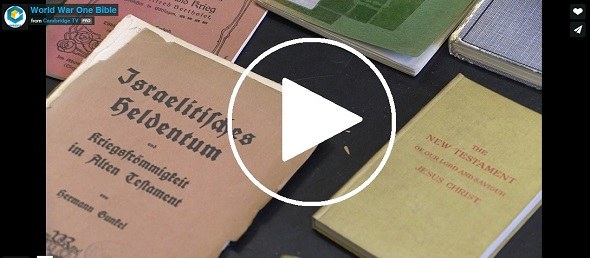The Bible is an inescapable part of the cultural landscape of WW1. It was perhaps the single most widely-read book during the war. It offered inspiration and consolation to soldiers and civilians alike. Preachers and politicians used it to instil national pride and fighting spirit, and conscientious objectors in defence of pacifism. It offered concepts and metaphors which helped men and women make sense of their everyday experience. Its words were quoted with pious hope on gravestones and war memorials, and recast by angry poets. It was read in every language and on all sides of the conflict by Christians (Protestant, Catholic and Orthodox) and Jews. Despite the challenges of 19th-century advances in science and biblical criticism, the Bible remained at the centre of Western culture.
Yet the Bible is something of a blind spot in our understanding of the Great War and its legacy. It is a popular commonplace that the war provoked a crisis of belief across the Western world. In Britain, at least, the war has regularly been seen as the epitome of waste and futility, and a source of deep disenchantment with traditional religious values. Nevertheless, historians increasingly recognize that religious faith remained a fundamental source of identity, conviction and morale both in the trenches and on the home front. The centrality of the Bible to that faith is clear from the millions of Bibles printed and distributed each year of the war (especially to soldiers), the thousands of biblical sermons preached every week, and the continued vitality of both popular and scholarly publishing on biblical themes. The Bible and biblical interpretation therefore offer an important lens through which to examine the religious and cultural experience of a world at war, especially since it is a fundamental common point of reference across different religious traditions, institutions and national contexts.
Our project will focus on two main questions: How did the Bible shape and influence people’s experience of WW1, and how did the war impact its reading and interpretation? To address these questions we will set up three workshops to discuss the Bible in wartime culture. These will focus on the contribution of biblical scholars and the development of scholarship during the war, the use of the Bible on the front lines by Jewish and Christian soldiers, the role of the Bible in preaching and popular piety, and the place of the Bible in the memory and legacy of the war. We will attend to both the Allied and the Central Powers, allowing comparison of different national and religious contexts.
We will include participants from a range of disciplines (biblical studies, theology and religious studies, history, literary studies, Jewish studies) as well as from key faith-based organisations and cultural agencies. Our aim is to support the exchange of ideas across disciplinary boundaries and to consolidate and extend research links between the UK and other parts of the world by bringing together academics from countries on both sides of the conflict. The international and interdenominational/interfaith aspect of the project is especially important because the history of WW1 has tended to be compartmentalized into different ‘national stories’. The Bible was common to all sides but often used very differently, and therefore makes an ideal point of comparison.
The project will also foster public understanding of the Bible’s place in the experience and legacy of WW1. We will work with our impact partners, the Bible Society, St Paul’s Cathedral, and Westcott House to produce publications and run workshops aied both at religious leaders and the wider public.


